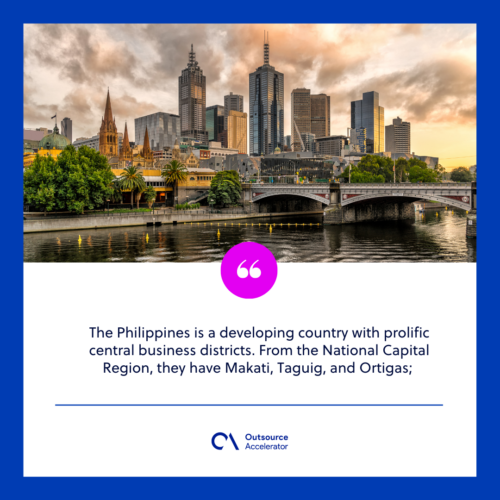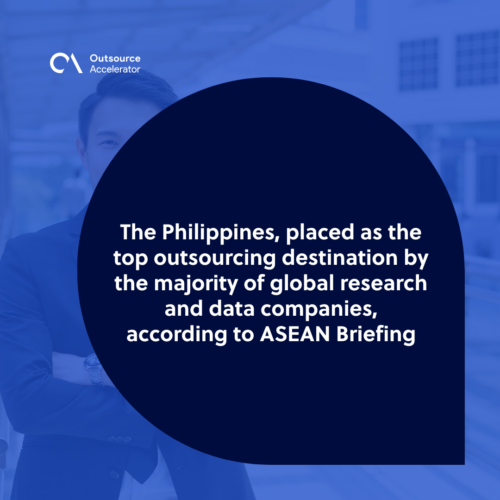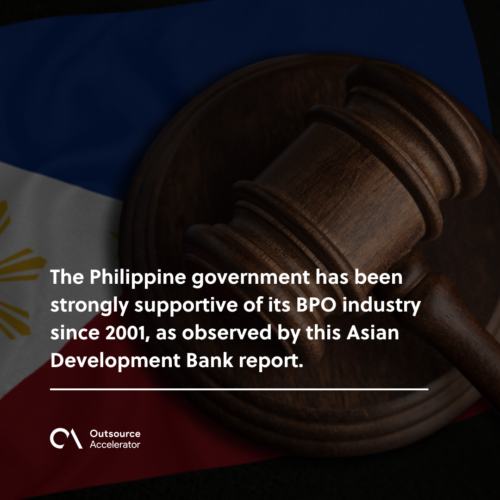Benefits of offshoring your recruitment process to the Philippines – RPO

You may not have realized it, but we all engage in outsourcing almost every day of our lives. We constantly seek someone with the right expertise, tools, and time to do certain tasks for us.
An athlete who needs new running shoes goes to a shoe store. A staffing firm that needs extra help in the recruitment process calls an offshore RPO provider.
In a sense, offshore RPO providers are the experts in their fields.
Staffing firms seek them out so they can utilize their knowledge and facilities, giving them the option to run their firms in a more hassle-free and less time-consuming manner.
And in the same way, an athlete does not just pick whatever comes his way when choosing a pair of shoes, as the executive of your staffing firm, you also carefully select the offshore RPO provider you’re going to partner with.
You want the best one out there, but being the smart executive that you are, you want it to be at a reasonable price without having to give up on quality.
In terms of finding the best offshore RPO firms to partner with, cost and quality are the biggest factors to consider. Companies, big or medium-sized, are in constant pursuit of finding ways to lower their costs and raising profits, and in this case, in the recruitment area.
This has got the recruitment industry scrambling to innovate. Staffing firms started asking, “How do we further save on recruitment costs and increase efficiency?” It turns out, the answer is in offshoring.
Offshoring to the Philippines
It’s no surprise that most offshoring companies turn to the Philippines. After all, the country is strategically located in Southeast Asia—a hub and the melting pot of various cultures and differences.
The Philippines is a developing country with prolific central business districts. From the National Capital Region, they have Makati, Taguig, and Ortigas; just in Luzon, they already have budding districts outside of the Metro too.
The BPO sector in the Philippines is now more than just call centers. Creative agencies, digital marketing firms, and of course, Recruitment Process Outsourcing companies. All of these subsectors bring in more opportunities for the Filipino people.
Offshoring may turn a few heads, especially in the ethics of it all. However, in general, offshoring is a practice that both saves company resources and brings in foreign and local investors.
That being said, it’s not a total shock when offshore companies turn their eyes to the Philippines. With its endless pool of candidates to the people’s hospitality, it’s a great place to work and live.

So how does offshore RPO work?
Offshore RPO works by staffing or recruitment firms outsourcing its recruitment process, in part or in full, to other offshore firms with similar capabilities.
By having an “extension” of sorts, the client can get more work done which is especially advantageous for VMS arrangements. These offshore firms also have relatively more cost-efficient services as compared to the client’s own country.
Countries in the Asia Pacific, with their RPO market expected to expand nearly fourfold by 2022, make good RPO offshoring destinations. They’re known for their more affordable labor.
The Philippines, placed as the top outsourcing destination by the majority of global research and data companies, according to ASEAN Briefing, most specifically, is the one to watch out for. Mainly because of the Philippines’ low-cost recruitment solutions, its RPO industry is set to continue to rise in the coming years, says Staff Virtual.
But affordable labor aside, what else do the Philippines have that makes it a good offshoring site?

Benefits of Offshoring RPO to the Philippines
According to Beshouri and Farrell of Mckinsey & Company, Philippines is in a strong position to capitalize on the opportunities of offshoring. All thanks to its skilled people, supportive government policies, and industrialization.
High literacy rate and English proficiency
The literacy rate in the Philippines is relatively high. Around 95.9 percent of the total population can read and write which is among the highest in the globe, a percentage most impressive when compared to other developing countries.
Over 450,000 graduates are produced yearly. These numbers can add up to the labor pool of the country, with graduates specializing in different sectors, such as accountancy, law, and information technology.
With these many trainable and diverse workforce, it is not surprising to know that the Philippines ranked 1st in the availability of knowledge-based jobs, according to a survey by the US-based Meta group.
This large and steady pool of workers has a proficient use of the English language which is the greatest edge of the country against its competitors. Also, Filipinos have a more neutral accent compared to that of other countries.
Chosen candidates who are scheduled for interviews expect to talk to a representative who speaks the offshore staffing firm’s English accent. Talking with someone who sounds familiar due to having the same accent develops a sense of trust and familiarity.
In this sense, it makes it naturally easier for Western-based staffing firms to communicate with Filipino recruiters and sourcers.
Because communication is vital in the HR industry, what’s definitely worth taking into consideration when choosing an offshore RPO firm is the capability of the offshore RPO firm to communicate fluently and smoothly.
You see—recruitment plans need to be decided and agreed upon, resumes need to be read, candidates need to be interviewed, and if all sides understand each other, then they can produce better results.
Affinity for Western Culture
Since the end of World War 2, Filipinos have found an affinity for Western culture, specifically with the Americans. American occupation may have ended decades ago, but the cultural influence is still felt and celebrated in the country.
This intertwining of Filipino and American culture is further strengthened when many Filipinos now have relatives who work abroad or are already settling there.
Again, just like by speaking the same language, this embraces for Western culture positions the Filipinos as easy to work with. This affinity to Western culture has given Filipinos better understanding of Western trends, nuances, idiomatic expressions, and work ethics.
It’s practical and nice to work with people who can understand not just your language, but the context and nuances beyond words.
Supportive Government Programs and Policies
The Philippine government has been strongly supportive of its BPO industry since 2001, as observed by this Asian Development Bank report.
Some two decades ago, the Philippine government formed the Information Technology and E-Commerce Council, with its main objective being to develop the country as an E-service hub.
Just four years later, Philippine Cyberservices Corridor was launched. It was created to provide a variety of BPO services. And in 2006, the government went as far as providing education grants for the training of BPO applicants.
A recent effort by the Department of Information and Communications Technology involves a training program on Information Technology-Business Process Management planned for the purpose of improving the qualifications of the local talent pool.
These policies, the Information Technology and E-commerce Council and Philippine Cyberservices Corridor, both working on improving the country’s IT services, have led to offshore RPO providers gaining more efficient and modern IT-related technology.
The training programs led by the government help in producing a more high-quality workforce that can handle these new technologies. They are now better equipped at analyzing a great amount of data, creating dashboards and summary reports, and pinpointing patterns for quick managerial decisions based on the information gathered.
Most recruitment services that are offered by Philippine RPO firms involves handling large computer data.
With the right tool to process this data and knowledgeable people in charge, Philippine offshore RPO providers have better chances of finding their staffing firm partner suitable candidates. This means better ways to communicate with clients and better ways to work with teams at home and abroad.

Industrialization
Due to government assistance, industrialization, in terms of modern IT, is fast improving.
In fact, during the IT & Cyber Security Forum, digital government programs meant to create stricter cybersecurity programs have been revealed. It aims to make the country a hub for local and offshore businesses.
The forum announced that an independent government agency in charge of the facilitation of data privacy is set to be formed. And a blueprint for the distribution of fiber optics that is going to speed up the internet in the country has already been constructed.
Another development in Philippine IT is the popularity of cloud-based software to store data. Info Alchemy, a Filipino-owned IT consulting and Outsourcing company, reported that the Filipino IT professional is capable of developing and providing cloud-based application systems.
Strict information security, fast internet, and cloud-based software. These are all vital for offshoring recruitment since most of the services offered by RPO firms such as sourcing resumes, scheduling interviews, and mailing candidates, are done virtually.
By having data protection technologies in place, Philippine firms effectively mitigate the risks of a data breach. It’s also important to note that the data collected during the recruitment process are often in great volumes.
By having cloud servers to store big data, Philippine RPO firms are going to save your company hardware costs, allow you to have disaster recovery, and increase the ease of collaboration.
Sharing data through a cloud server also makes it possible for 24-hour business activities. Staffing firms who are under VMS arrangements, where time is of the essence, are going to find this setting most favorable.
By outsourcing some of the recruitment activities, such as identifying candidates, and reading resumes, staffing firms get to save time on doing repetitive tasks and enable them to focus on working on core business.
While the foreign staffing firm sleeps at night, the RPO provider in the Philippines can continue with the recruitment processes, as usual. Their combined efforts result in double the work being done, hereby giving them higher recruitment velocity. This means that more work gets done in the shortest time possible.
The lengthy discussion on the benefits of offshoring recruitment to the Philippines all sounds good and true. But as a skeptic, you may be asking “where’s your proof?”. An offshore RPO firm in the country did a series of case studies regarding their services. We’ll let the results do the talking.
Some Case Studies
In a series of case studies published by one of the leading offshore RPO providers in the Philippines, with their clients’ participation, the performance of their offshore services was quantified in terms of cost savings and revenues earned.
In terms of sourcing, the client’s in-house recruiters using the offshore sourcing services received an average of 50% more placements per month. And for every 1 dollar spent on offshore recruiting services, the client gained an average of 4 dollars in gross margin from placements.
As for VMS recruiting services, offshore Philippine recruiters were found able to match the performance of the client’s in-house recruiters, but at a significantly lower cost. A solid 68 percent reduction in loaded cost per recruiter was found.
Offshore administrative support was also measured. The result turned out favorably for the client. By offshoring administrative duties to the Philippine RPO firm, the client was able to save 700 thousand dollars annually. The cost to do the same administrative work was reduced by -45 percent.
As the old saying goes, numbers don’t lie. These numbers have a story to tell, and it’s pretty clear what the message is on this one. Low cost and increased profits. It has always been the goal for companies, and this is now possible by offshoring your recruitment process to Philippine RPO firms.
As an endnote
The current setting of the Philippines makes it a good RPO offshoring destination.
Filipinos have, for so long, been fluent English speakers and they have always been known to be welcoming towards other peoples. Because of globalization, the government has found a way to make use of these qualities to help boost the economy, and they are going all-out to support the outsourcing industry.
Industrialization, in terms of modern IT, has equipped offshore Philippine RPO firms with the right tools, strategic economic policies have served as a guarantee for success, great and knowledgeable supply of Filipino workforce has become a sought-after human resource, and finally, the understanding of Western culture bridges the Philippine work ethics with that of its offshore clients.
Interested in partnering with a Philippine RPO firm? Got any questions on the RPO industry in the country? Feel free to leave a comment down below.
This was originally published on the Sysgen RPO website.







 Independent
Independent




